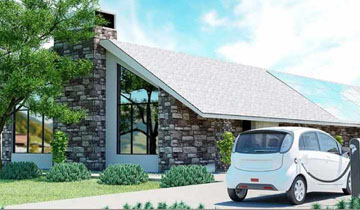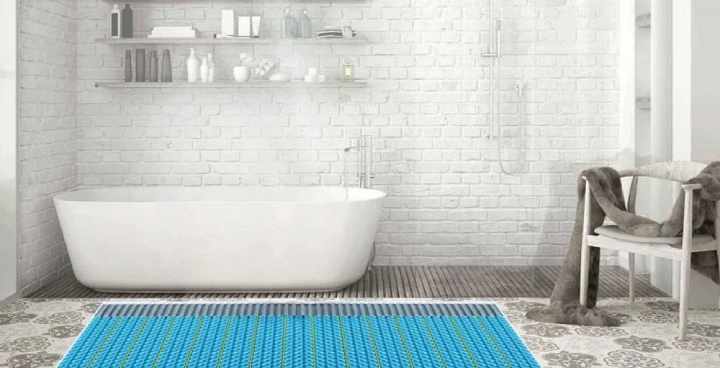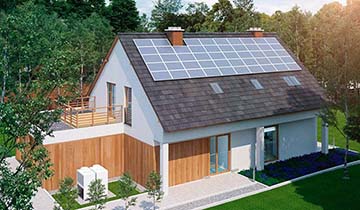5 min read
Considering using electric radiators? Everything you need to know
Popularity in electric heating is rising and it won’t be slowing down any time soon. Let’s take the electric radiator market. By 2025 the European...

It is a well-known fact that the majority of homes in the UK are using gas heating. The reasons vary, from ‘it was there when we moved in’, to it is cheaper to run than alternatives. However, with the introduction of the Future Homes Standard and SAP 10, the Government have signed us all up to be more environmentally conscious members of the world’s society.
How exactly is this? Well, the UK is committed to reducing carbon emissions to net zero by 2050. Even though this is almost 30 years away we need to prepare for it now, to ensure this target can be met.
Under the Future Homes Standard, gas boilers will be banned in new build homes by 2025. That is only 4 years away! A much closer and timely goal. Of course, as it states, it is a future home standard and is focused on the efficiency of new homes, but in order to meet that goal of net zero emissions, the challenge of converting existing housing stock needs to be addressed.
Electric heating has become an extremely viable option. Firstly SAP 10 (launching later in 2021) has reduced the carbon emission factor of electricity which makes it much less impactful on the environment compared to traditional gas heating. Secondly, electric is 100% energy efficient at point of use.

With only a meagre 5% of existing homes in the UK currently carbon neutral or low in carbon emissions, the undertaking of converting existing housing stock is not a small task. Depending on the size of the property and level of conversion, the cost investment needed can run into the tens of thousands of pounds. Of course, you can apply for grants such as the Green Homes Grant in which you could receive a grant of up to £5,000 per household towards making your home much more energy efficient.
The cost of converting to electric heating will greatly depend on your existing heating system, and of course the qualified gas engineer that you contract to decommission your existing system. However, on a plus side, it is a lot less costly to install a new electric system in your home. As there is no need for a flue, condensate pipes or other external fittings for your heating system.
To convert your home, you will need to have your existing boiler removed. As well as having the access points for pipes closed off and sealed correctly. This is where your qualified gas engineer comes to the forefront. They will be able to tell you what needs to go and what can stay. This is definitely a job for a professional, so please do not try to do-it-yourself.
But electric heating costs more to run, right? From first glance this is true. However, this does not take into consideration that electric heating systems take less time to reach the desired comfort level as well as future plans to fairly balance out the cost of using the more environmentally friendly electric heating alternative.

Where should you start? Well, the best place to start is to figure out your budget and then move on from there. A few questions we believe that are in your interest to consider are:
Electric heating systems come in a variety of forms, including radiators, storage heaters, heat pumps, infrared heating panels, underfloor heating (UFH) and boilers. For the purpose of this article, we will focus on radiators, electric underfloor heating and electric boilers.
Electric Radiators
Electric oil filled radiators are the most similar to traditional water based radiator heating systems. Heating the oil within them produces both a radiant and a convected heating current. Electric panel heaters work by heating the air and creating a convection current.
When specifying an electric radiator, the usual rule is the larger the room the higher the output wattage you will require. If you do overspec the output it will just mean that the radiator will switch off sooner because the space has reached the desired temperature faster.
For a more in-depth guide to selecting the right radiator for your project, read our blog post ‘Electric radiators and what you need to know‘.
Electric Underfloor Heating (EUFH)
Electric underfloor heating can be easily installed in both renovation and new build projects because it has minimal impact on the height of the floor build-up used. Electric underfloor heating is much quicker and easier to install when comparing with wet underfloor heating alternatives. On average, it takes just a few hours (depending on the size of the room) to install and then it is ready for the final floor covering. However, you will need a Part P registered electrician to make the connections for you and ‘sign-off’ the installation. Because electric underfloor heating is faster to install than alternatives, you can expect cheaper installation costs.
When it comes to selecting the right electric underfloor heating system for your project, it is best to choose the system that works best with the floor finish that you intend to use. For example, ThermoSphere Membrane and ThermoSphere Mesh are ideal for tile and stone floor finishes. ThermoSphere Foil is perfect to use for rooms where a wood, carpet or vinyl floor finish will be applied. If you are creating a wet room them ThermoSphere Membrane is the perfect choice when combined with our tanking kit.
Another important consideration is how quickly you want the space to heat up to the desired temperature. The higher the wattage the faster the system will heat up. For example, 200W ThermoSphere Mesh is ideal to use in rooms that are used less frequently than others, such as conservatories.
If you need further help on selecting the right electric underfloor heating system, take a look at ‘Your guide to electric underfloor heating mats‘.
Electric Boilers
Gas boilers are responsible for 60% of carbon dioxide emissions in the UK and 22 million homes in the UK use them. The government is making significant steps to help reduce the impact by banning gas boilers in new builds by 2025. Not to mention, that having an electric boiler means there is no more risk of a gas leak in your home, as well as the removal of the unsightly external units and pipes. An electric boiler makes less noise and can be installed in places as small as a linen cupboard or under stair storage area.
ThermoSphere electric boilers are 99.8% efficient and do not require an annual service so there are no maintenance costs to worry about. PLUS, you have a 2-year warranty which includes the hydraulic pump set, so relax and reap the benefits.
Our friendly and knowledgeable team are available from 07.00 – 17.00 Monday to Friday and you can contact us by phone, email, or use the instant chat on our website. All of our contact details can be found here or give us a call on 0800 019 5899.

5 min read
Popularity in electric heating is rising and it won’t be slowing down any time soon. Let’s take the electric radiator market. By 2025 the European...

6 min read
The energy crisis and extreme price volatility in fossil fuel markets has had a dramatic impact on the cost of living for many homeowners, and as a...

9 min read
If you’re one of over 2 million homes in the UK not connected to a mains gas supply you know the challenges surrounding heating your home. In this...